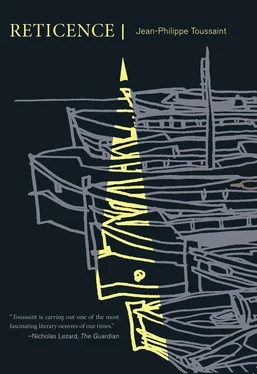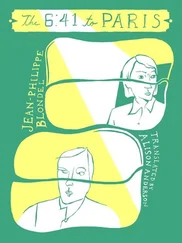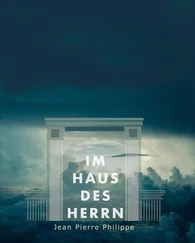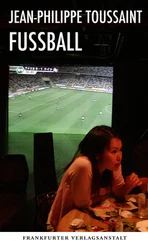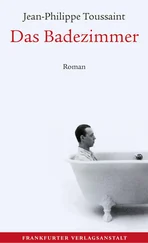After lunch I went for a walk in the port while waiting for the taxi to come pick me up in Santagralo at around three thirty. I’d sat down on a steel block at the end of the jetty, and I stayed there beside my son’s stroller watching a fisherman standing in his boat preparing trolling lines. A purplish octopus lay in a lump at his feet, which he picked up from time to time like an old rag to cut off a snippet with a little knife, holding the blade between his teeth while he bated the hook. Each line had around twenty or so hooks, and each time he cut off a new hunk of bait he dropped the octopus carelessly back onto the deck of the boat with a squishy plop before immediately thrusting the new fragment of flesh onto the barb of one of the free hooks, and in this way he worked his way along with a series of firm and precise gestures. I’d gotten up to go over to the side of the dock and stood across from him watching him work. He’d almost finished now, three of his lines were ready, looking like long garlands of little pink and white octopus bits strung together carefully on the deck of the boat. You’re going out fishing now? I asked him. He didn’t answer right away, finished baiting one of his hooks. Tomorrow, he finally said without looking at me, and that was the end of our conversation, which had in fact pretty much exhausted the topic: he was going out fishing tomorrow, if I really wanted to know (and fortified with this information I went back to the square to wait for the taxi).
The weather in the village was very gray and a fine rain had started to fall, a regular, unpleasant drizzle that hung in the atmosphere and permeated my clothes with humidity. My son had gone to sleep in his stroller, his little blue anorak tucked snugly around his chest and the plastic bag with the groceries I’d bought that morning hanging disconsolately from one of the handles. The bag was already covered with a thin film of rain, a few droplets trickled here and there down the creased white plastic, while inside it a bottle of water and a few cartons of milk were barely visible and had already started to stretch the fragile surfaces of the bag. All of the stores in the village were now closed, and the square — consisting of a sort of expanse of dirt and gravel shaded no doubt on very sunny days by several trees planted nearby — was deserted. There was a little fountain in the middle of the square into which the rain fell with the faintest of splashes, beside which stood three abandoned, dilapidated benches. They must have been green in their day but they were now almost grayish, all peeled and empty except for the middle one, where a solitary old man was sitting who I hadn’t immediately noticed under his cap. I saw the taxi enter the village and drive down the main street from a long way off, and as it pulled up I picked up my son and held him in my arms to open the door while the driver put the stroller in the trunk. My son was still sleeping when the taxi left the village (he was asleep in my arms, I could feel the warmth of his little body against my chest).
The sky over the road was very dark as we left the village. It was just a bit before four in the afternoon but the light was already so gray that it seemed like night had already fallen. The driver had to turn on the headlights as well as the windshield wipers, which rubbed across the glass with a soft squeaking sound. Here and there a fine blanket of fog clung to the wet branches of the trees, and the humidity that reigned on the side of the road even seemed to have spread inside the car, because I was starting to feel pricks of rheumatism in my calves and feet. On the way back the road climbed and climbed under the rain, until about halfway when all of a sudden the view cleared at a bend and Sasuelo appeared down below in the mist, less than three miles as the crow flies, bordered by a uniformly gray sea. The small island across from the village was also visible, whose oblong contours and rocky slopes stood out on the other side of Sasuelo Bay. We still had to go back down the other side of the hill to reach the village, and now you could see the entire route at a glance, snaking its way down toward the sea. The taxi almost came to a standstill at the hairpin curve at the top of the descent into Sasuelo, and we crept past an abandoned church that was practically in ruins before picking up speed on the other side. The road was narrower now, and continued downward in a series of twists and turns between two rows of dense, rain-soaked undergrowth. I looked absently out the window, noticing from time to time the familiar form of some mushroom or other growing beside the embankment amid rotting leaves, a young parasol mushroom or death cap, which disappeared immediately from my line of vision as soon as I’d caught sight of it, leaving no more than a fleeting image in my mind while the taxi had already put over one hundred yards between me and the mushroom that had so intrigued me for a fraction of a second. There was now another car behind us that had also turned on its headlights in the thin mist that clung to the road, and at the last turnoff to Sasuelo I noticed that it turned as well, continuing to follow us from a distance under the rain. I turned around for a moment to look at it through the steamed-up rear window of the taxi and, as we slowed to enter Sasuelo, I saw that it was the old gray Mercedes with a dented fender I’d seen the night before on the Biaggis’ property.
The next morning I left the hotel before dawn as the village was still steeped in bluish darkness. A very white pre-morning moon was etched in the sky above the regular lines of telephone wires. All of the houses were still quiet, and when I entered the deserted square I immediately saw that the old gray Mercedes was parked there in the dim light. I approached it without a sound, walking around it to take a quick look inside. The seats were very battered, practically demolished. The leather was completely worn through in places, and there was a three or four inch gash in the middle of the driver’s seat revealing a sort of yellowish synthetic foam. A crumpled jacket lay on the back seat amid a clutter of old newspapers and fishing gear, rods and lines, weights, bags of fishhooks, and old plastic bottles. It had rained a lot the night before, and nearby on the ground a large puddle of still water dimly reflected the trees and rooftops of the neighboring houses in the darkness. A light gust of wind occasionally sent a ripple over the surface of the water, blurring the reflections for a moment. Then, slowly, the image recomposed on the surface, trembling for another few seconds before stabilizing, and I saw that the center of the puddle mirrored the silvery shape of the old gray Mercedes, around which, however, by I don’t know what play of perspectives or blind spots, there was no trace of me at all.
I walked slowly away from the square leaving the puddle behind me in the darkness, and headed over to the port where several boats rocked imperceptibly in their moorings with a muted lapping sound. I’d sat down on the jetty near a heap of tangled fishing nets still speckled with bits of decomposed fish, and I remained sitting there in the dim light with my coat wrapped tightly around me watching the day break over Sasuelo Bay. The sea was still very dark, with hardly a ripple right out to the horizon, and, as the sun rose behind the mountain, slowly lighting up the far side, which was now topped by a distant halo of light, the boats swaying softly in the port started to take on hints of russet and orange, while the contours of the surrounding docks, fishing nets, rocks, trees, and flowers slowly shook off the bluish imprint of the night.
It was that morning, not long before the sun went up, that I discovered the dead cat in the harbor. At first, from a distance, I’d taken the black form floating between the boats for a plastic bag, or perhaps an old blanket rolled up in a ball, and, intrigued by this object on the surface of the water, I’d gotten up and gone over to the edge of the pier. The body was floating in the feeble light less than ten feet from the jetty, its ears and part of its back just above the waterline. The way it was floating it was impossible to see its face, and it was only when the current caused its body to pivot slightly that I saw it had a fish head in its mouth, from which a broken bit of fishing line protruded a couple of inches. And it was precisely this piece of line that made me think later in the evening — at the time I’d just looked at it without giving it too much thought — that the cat had been murdered.
Читать дальше
